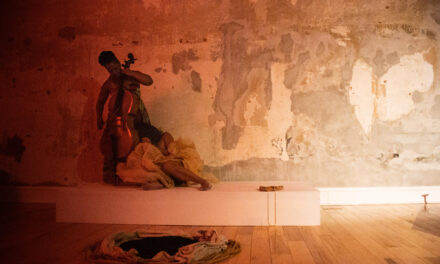The Bel Canto Company, under the direction of its Artistic Director and Conductor Welborn E. Young, once again proved that it is the premiere vocal ensemble in the region. Offering a wide variety of holiday fare, mostly from the 20th century, the 25-voice choir presented a rich bouquet of traditional and well-known seasonal favorites cast in new arrangements, as well as the unusual.
Young and Company ushered in the concert with the “Procession” from A Ceremony of Carols by Benjamin Britten (1913-1979). With a divided choir of a half dozen singers on either side of the altar, the rest of the BCC solemnly entered Christ United Methodist Church down the long center aisle. The “Hodie Christus natus est” text was tenderly sung with a gentle harp accompaniment, expressively played by Bonnie Bach.
The “Procession” led straight into “Out of the Orient Crystal Skies” by Richard Zgodova with no applause breaking the mood. Zgodova is a contemporary composer/pianist/arranger living in the Minneapolis area. This is a lovely a cappella number that showed BCC’s fine vocal blend and rhythmic flexibility.
The a cappella and syllabically set “Videntes Stellam” by Francis Poulenc (1899-1963) continued the theme of restrained joy expressed in the previous two works. The tempo picked up noticeably with Britten’s “This Little Babe,” again from A Ceremony of Carols. Like the opening “Procession,” this movement, too, uses harp, but in a much more active role. Bach’s playing was first rate, and the BCC sang strongly. It’s always a delight to hear an ensemble that is up to the demands of the rapid imitative lines, a prominent feature of this piece.
The crown of the first part of the concert was an arrangement of “O Magnum Mysterium” by Morten Lauridsen (b. 1943). The singing of this work created a halo of sound; the close harmonies were ever so gently offered; beautiful.
The second part of the concert Friday night featured the Northwest Guilford High School Honors Vocal Ensemble, a group of 25-plus teens well prepared and conducted by Beverly Alt. This young ensemble displayed a fine sound and a professional presentation.
The opening “Here We Come A-Caroling,” arranged by Brant Adams (b. 1955), was a collection of familiar carols. The Hebrew Tune “Hiney Mah Tov” arranged by Iris Levine provided the group the opportunity to sing in Hebrew. “What Sweeter Music” by John Rutter (b. 1945) is a lovely work, and who doesn’t like “Carol of the Bells,” especially when sung with such enthusiasm?
“Il Est Né” arranged by Mark Hayes (b. 1953) outfits a familiar tune in hip garments; this was the only piece in which the choir used music. Ably accompanying the Vocal Ensemble was pianist Robert Mathews, a member of the BCC. The Greensboro Youth Chorus, directed by Anne Doyle, will sing in Monday night’s performance.
The final third of the concert joyously began with “Jubilate Deo” by Mack Wilberg (b. 1955). The work contains a crucial organ part, which was confidently played by John Alexander. The bouncy rhythms in the score made for a festive mood.
Norman Luboff (1917-1987) and Paul Christiansen (1914-1997) were both justly known as conductors of first-rate vocal ensembles. Luboff’s “Still, Still, Still,” with piano accompaniment is a joy, and Christiansen’s a cappella arrangement of “Infant Holy, Infant Lowly” displayed the BCC’s impressive subtle nuanced singing.
“Blow, Blow Thou Winter Wind,” by George Shearing (b. 1919) initiated what Young called the “secular” portion of the program. BCC accompanist Karen Beres’ jazzy piano work in this composition added lots of color and jaunty rhythm. Gordon Langford (b. 1930) used the word “jingle” to provide lots of energetic background for his upbeat arrangement of “Jingle Bells.”
Both the a cappella “Sweeter Still: A Holiday Carol” by Eric William Barnum (b. 1979) and the organ-accompanied “In the Bleak Midwinter” by Harold Darke (1888-1976) gave further testament to the high quality music making taking place. Maestro Young seems to make his conducting a type of sound-sculpture, which brings out the best from the musicians.
The BCC was joined by the Honors Vocal Ensemble for the final piece of the program: the hauntingly beautiful “Silent Night” arranged by Craig Courtney. This work has become the traditional close of the holiday concert for BCC and features an evocative piano part, expressively played by Beres; the harp was an effective addition to the overall timbre.











